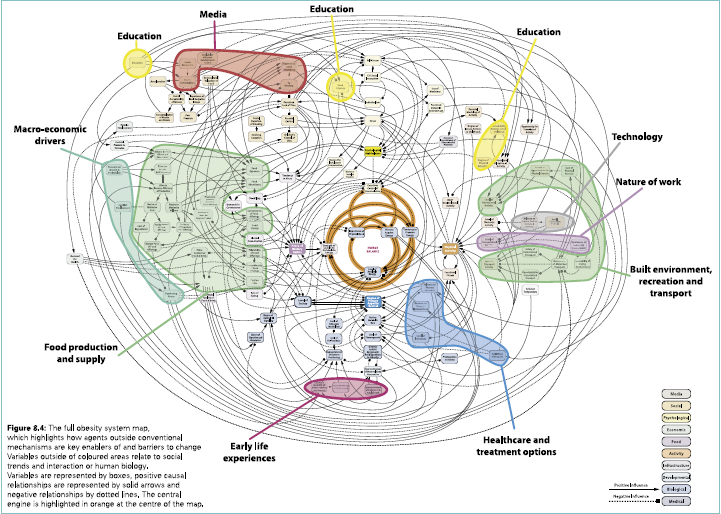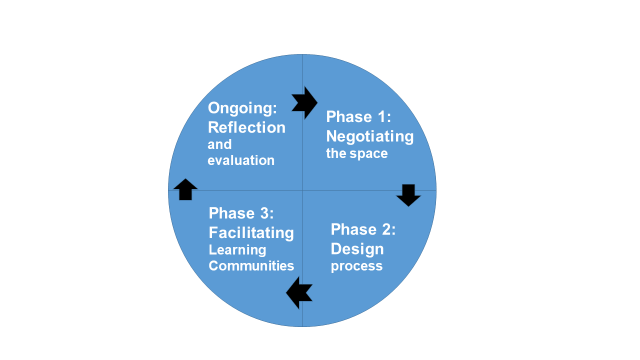People have complex lives. There’s rarely one single factor that brings someone to a clinic or to attend a voluntary sector support group or find themselves without a home. This example, an obesity system map (Vandenbroeck et al. 2007: 74), shows all the factors, and the relationships between them, that contribute to whether or not someone is obese:

People’s lives are very complex and service offers are just one part of the overall picture for an individual, a community or a society. In these complex environments, we can never say with certainty the effect that our services have. We cannot be certain of the outcome of our practice. The decisions and judgements we make as practitioners, service designers or commissioners are all framed by this sort of complexity. We cannot predict with certainty that intervention X will result in outcome Y. The only thing we can know with certainty is that when there are so many unknowns, there will be unintended consequences and we will make mistakes.
So how can we get better at our practice, whichever bit of the system we operate in? How do we improve? How do we make better judgements when we know the impacts are uncertain? The answer is that we need to improve our capacity to be comfortable with uncertainty, and our ability to act within it.
The first step is to become more comfortable talking with colleagues about our judgements, our mistakes and uncertainties. How do we create the conditions to talk authentically about the detail of our work? One way, developed by Dr Toby Lowe, is the Learning Communities approach.
A Learning Community is where a group of peers come together to design safe spaces and occasions to talk about the detail of their practice, about mistakes and uncertainties
Founded on ideas of positive error culture (Gigerenzer 2014), horizontal accountability (O’Donnell 1998) and collective improvement, a Learning Community is where a group of peers come together to design safe spaces and occasions to talk about the detail of their practice, about mistakes and uncertainties when making judgements when outcomes cannot be predicted.
Where Learning Communities have sprung up, participants report increased trust within teams, the unlocking of tacit knowledge and improvements in decision-making. A common response when colleagues begin to share honest accounts of their work is ‘I feel your pain’, swiftly followed by ‘Have you tried XXX because I worked with a client in a similar situation and when we did XXX it worked well…’. Aristotle calls this phronesis (or practical wisdom) and Learning Communities are a way for groups of peers to co-create a body of wisdom as a basis for collective improvement.
So how do Learning Communities work? There are three simple steps to setting up and running a Learning Community:

First, find a sponsor with the authority to gather peers together. Second, run a peer co-design workshop so the group can set out what is needed for them to talk authentically about their work. Then finally, run the Learning Community as designed by the participants. The Learning Communities Handbook includes templates and advice for how to run each of these stages as well as the theory underpinning the approach.
People have complex lives. Creating conditions to improve the judgements we make in the context of complexity is crucial to improvement. We feel your pain.
The Learning Communities Handbook is now available for download, give it a try!
Louise Wilson & Toby Lowe, October 2019
If you’d like to find out more, feel free to get in touch via Twitter or email.
Sources:
Gigerenzer, G. (2014) Risk Savvy: How to make good decisions. Allen Lane
O’Donnell, G. (1998) “Horizontal Accountability in New Democracies”, Journal of Democracy 9.3 112-126
Vandenbroeck, P., Goossens, J. and Clemens, M. (2007), Foresight Tackling Obesities:
Future Choices – Building the Obesity System Map, London: Government Office for Science, www.gov.uk/government/uploads/system/uploads/attachment_data/file/295153/07-1177-obesity-system-atlas.pdf (accessed 2 December 2015).
The authors are grateful to the ESRC for an impact acceleration award via Newcastle University to develop and test the Learning Communities approach and facilitator development materials.